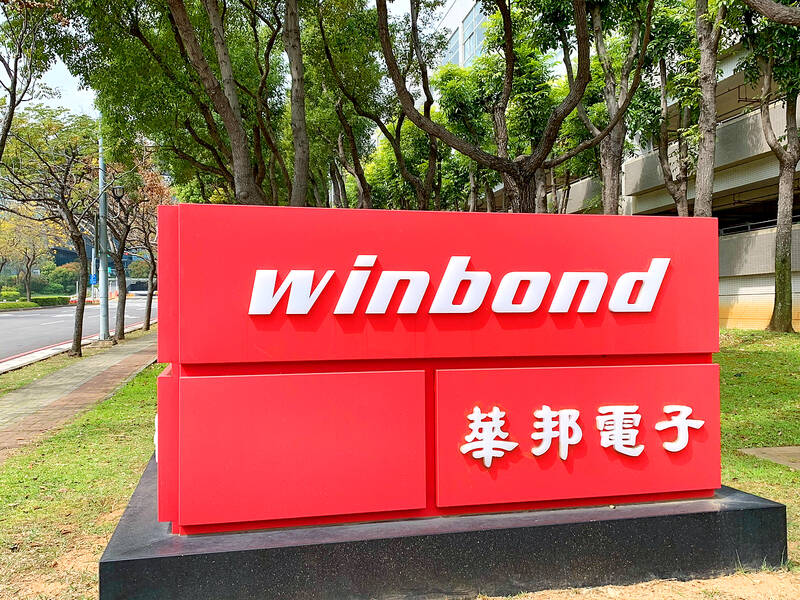Winbond Electronics Corp (華邦電) yesterday said demand for its tailor-made DRAM and NOR flash memory chips is expected to significantly pick up in the second half of this year.
The company’s new 3D memory product, dubbed CUBE, is expected to generate meaningful revenue next year, the Taichung company told an earnings conference.
The CUBE product, which is designed to stack a logic chip upon a memory chip, is cost-efficient and suitable for artificial intelligence (AI) devices with less computing power, Winbond president James Chen (陳沛銘) said.

Photo: Grace Hung, Taipei Times
The company aims to offer the product to dozens of customers, he said.
“Since DeepSeek (深度求索) launched its AI models during the Lunar New Year holiday, we have received numerous inquiries about our CUBE product,” he said.
Some analysts consider CUBE a low-density version of high-bandwidth memory chips that are used in AI devices with powerful training and inferencing abilities.
While Winbond is positive about the second half of this year, it remains precarious about overall market demand, given uncertainties related to geopolitical conflicts and US tariff threats, the company said.
“The fourth quarter last year was the trough of the year and the situation will be much better going forward,” Chen said. “In the customized DRAM segment, we are seeing strong indicators that point to a recovery” in demand.
The recovery in the communications segment, smartphones in particular, would buoy DRAM demand in the third and fourth quarters, he said.
The communications segment accounted for 24 percent of Winbond’s revenue last year, down from 25 percent in 2023 and more than 30 percent in previous years, he said.
Demand for DRAM chips used in TVs and automotive devices looks healthy, and demand for NOR flash chips used in servers appears strong, while demand for other applications such as notebook computers, smart home devices and vehicles seems stable, he said.
As multiple manufacturers exit the market, single-layer-cell NAND flash memory chips would become tight in the second half of next year, he added.
Overall, Winbond’s factory utilization rate would bounce back to nearly 100 percent this year, up from more than 80 percent in the fourth quarter of last year, he said.
Winbond reported net profit of NT$601 million (US$18.35 million) last year, compared with a net loss of NT$1.15 billion in 2023.
While the company’s earnings per share were NT$0.14, its board of directors decided not to distribute cash dividends to shareholders, it said.
Revenue last year rose 8.8 percent to NT$81.61 billion from NT$75 billion in 2023.
The chipmaker plans to spend NT$5.3 billion in new facilities and equipment this year, down about 66 percent from NT$15.5 billion last year.

NO BREAKTHROUGH? More substantial ‘deliverables,’ such as tariff reductions, would likely be saved for a meeting between Trump and Xi later this year, a trade expert said China launched two probes targeting the US semiconductor sector on Saturday ahead of talks between the two nations in Spain this week on trade, national security and the ownership of social media platform TikTok. China’s Ministry of Commerce announced an anti-dumping investigation into certain analog integrated circuits (ICs) imported from the US. The investigation is to target some commodity interface ICs and gate driver ICs, which are commonly made by US companies such as Texas Instruments Inc and ON Semiconductor Corp. The ministry also announced an anti-discrimination probe into US measures against China’s chip sector. US measures such as export curbs and tariffs

The US on Friday penalized two Chinese firms that acquired US chipmaking equipment for China’s top chipmaker, Semiconductor Manufacturing International Corp (SMIC, 中芯國際), including them among 32 entities that were added to the US Department of Commerce’s restricted trade list, a US government posting showed. Twenty-three of the 32 are in China. GMC Semiconductor Technology (Wuxi) Co (吉姆西半導體科技) and Jicun Semiconductor Technology (Shanghai) Co (吉存半導體科技) were placed on the list, formally known as the Entity List, for acquiring equipment for SMIC Northern Integrated Circuit Manufacturing (Beijing) Corp (中芯北方積體電路) and Semiconductor Manufacturing International (Beijing) Corp (中芯北京), the US Federal Register posting said. The

India’s ban of online money-based games could drive addicts to unregulated apps and offshore platforms that pose new financial and social risks, fantasy-sports gaming experts say. Indian Prime Minister Narendra Modi’s government banned real-money online games late last month, citing financial losses and addiction, leading to a shutdown of many apps offering paid fantasy cricket, rummy and poker games. “Many will move to offshore platforms, because of the addictive nature — they will find alternate means to get that dopamine hit,” said Viren Hemrajani, a Mumbai-based fantasy cricket analyst. “It [also] leads to fraud and scams, because everything is now

MORTGAGE WORRIES: About 34% of respondents to a survey said they would approach multiple lenders to pay for a home, while 29.2% said they would ask family for help New housing projects in Taiwan’s six special municipalities, as well as Hsinchu city and county, are projected to total NT$710.65 billion (US$23.61 billion) in the upcoming fall sales season, a record 30 percent decrease from a year earlier, as tighter mortgage rules prompt developers to pull back, property listing platform 591.com (591新建案) said yesterday. The number of projects has also fallen to 312, a more than 20 percent decrease year-on-year, underscoring weakening sentiment and momentum amid lingering policy and financing headwinds. New Taipei City and Taoyuan bucked the downturn in project value, while Taipei, Hsinchu city and county, Taichung, Tainan and Kaohsiung